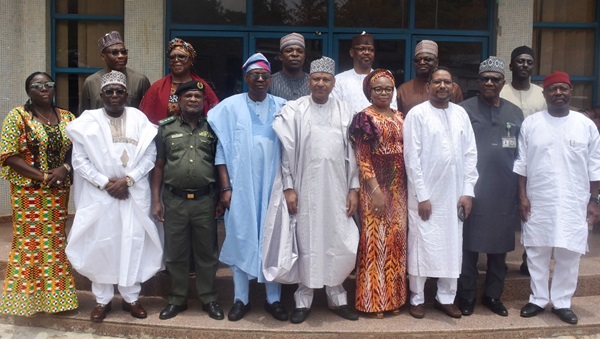
The Minister of State for Environment, Dr. Iziaq Salako, has emphasised journalism’s role in addressing the country’s environmental crisis.
Salako was speaking during a World Press Freedom Day (WPFD) address in Abuja, organised by the Federal Ministry of Environment and the UNESCO office in Abuja, in collaboration with the Federal Ministry of Information and Orientation, under the theme “A Press for the Planet: Journalism in the Face of the Environmental Crisis”.
He stressed that the environmental crisis lies at the heart of most of humanity’s challenges. It poses the greatest threat to our existence, encompassing climate change, biodiversity loss, and pollution.
According to Salako, the environmental crisis is a primary factor in the loss of lives and property due to disasters, exacerbation of poverty, food insecurity, armed conflicts, loss of livelihoods, public health challenges, displacement and more.
Journalism serves as a catalyst for change in advancing the environmental agenda, acting as a watchdog for accountability, transparency, social justice and a voice for the voiceless through investigative reporting, insightful analysis and compelling storytelling.
“Journalists illuminate the critical issues of the environmental crisis in our nation, inspiring mass action towards positive change by communicating the threats posed by the climate crisis and encouraging informed decisions related to environmental responsibility. Without collective action, we will struggle to overcome these environmental challenges,” Salako said.
Salako emphasised that to achieve global and national agendas like net zero emissions, energy transition, biodiversity conservation beyond national borders, 30 by 30 conservation targets, ending plastic pollution, and other pathways to address the environmental crisis, “The press and journalists form the framework for informing, educating, stimulating discussion, mobilising and setting the agenda for the public, who are the government’s employers,” Salako stated.
He highlighted that Nigeria’s Nationally Determined Contributions (NDC), Long-Term Low Emission Development Strategy, commitment to achieving net zero emissions and framework for biodiversity conservation are at the forefront of efforts to combat the environmental crisis in the country. These commitments outline a path towards sustainability, emphasising the need for collaborative action, innovation and accountability, showcasing Nigeria’s dedication to mitigating climate change and preserving the planet’s health for future generations.
The Federal Ministry of Environment is actively promoting nature-based solutions through tree-planting, mangrove restoration, urban greening, wetland restoration, adoption of environmentally friendly energy sources, remediation of oil-polluted communities, expansion of protected areas and addressing desertification, drought, flooding and erosion.
The ministry said, by addressing environmental degradation, which fuels unhealthy competition for scarce resources, a more resilient society can be created, to eliminate the insecurity currently faced in the country.
In his address, the Minister of Information and National Orientation, Alhaji Mohammed Idris highlighted that the WPFD theme underscores the urgent need to address the environmental crisis and advance sustainable development, including climate change, biodiversity loss, pollution and resource depletion, which pose severe threats to humanity and the planet, demanding immediate and decisive action.
He said: “In the face of this crisis, journalists emerge as truth guardians and accountability champions. They expose environmental injustices, unveil wrongdoing and amplify the voices of those most affected by environmental degradation. Through investigative reporting, they hold governments and corporations accountable for their actions and advocate for policies that promote sustainability and protect the planet.”
Idris acknowledged the importance of responsible media coverage in enlightening, informing and educating Nigerians and the world. He emphasised that through credible and timely information, everyone can be well-informed, and the media can serve as a valuable tool for promoting transparency and accountability.
He assured that the ministry and government will ensure the safety and provide an enabling environment for journalists to carry out their assignments.
“As we celebrate World Press Freedom Day, it is crucial to reaffirm our unwavering commitment to protecting the rights of journalists, ensuring their safety and security and building a future where journalism thrives, press freedom is upheld and our planet is safeguarded.”
The director-general of UNESCO, Ms. Audrey Azoulay emphasised that WPFD is a call to action to protect journalism and ensure free, pluralistic information.
Azoulay encouraged participants to recognise that the climate challenge is also journalistic and informational, highlighting that effective climate action requires access to free and reliable scientific information.
This year’s WPFD encourages governments to engage with the media to address climate change issues that contribute to insecurity in Nigeria.
It calls for major social networks to enhance their moderation and regulation measures to combat misinformation and conspiracy theories related to climate change, aligning with the guidelines for the governance of digital platforms published by UNESCO. It also urges equipping citizens with critical thinking skills to confront misinformation.
Azoulay emphasised the need to protect journalists, media professionals, artists and scientists who often face threats, harassment, violence and censorship for their work. She cited a UNESCO study showing that environmental reporters have faced attacks, threats, or pressure, with 44 environmental journalists killed in the last 15 years.
Access to reliable information is particularly vital in this “super-election year,” with billions of citizens called to the polls. UNESCO will launch initiatives dedicated to the environment to provide greater protection for environmental journalists, enhance media education and improve information on major social networks.

